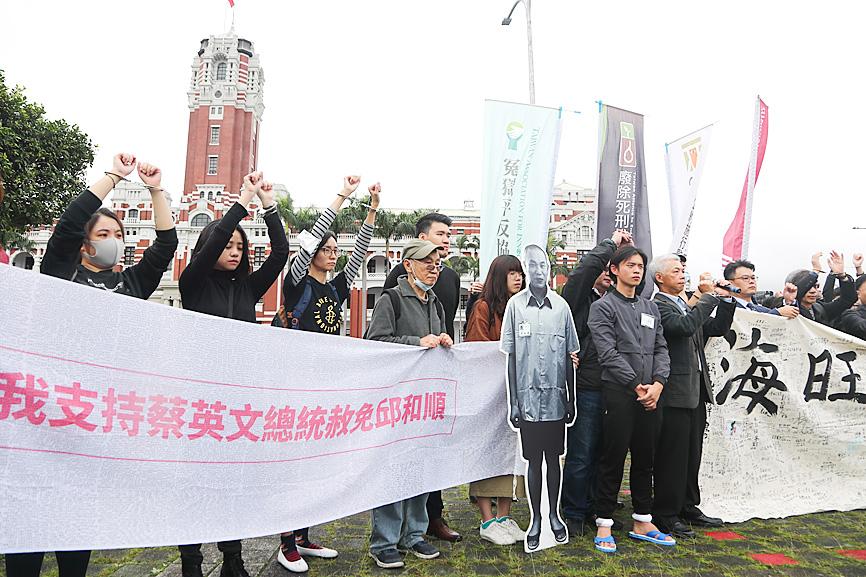Premier Su Tseng-chang (蘇貞昌) yesterday introduced a National Action Plan on Business and Human Rights, becoming the second country in Asia — after Thailand — to adopt such a measure.
The government’s strong emphasis on human rights issues, especially concerning labor conditions, could prove beneficial for Taiwan in international trade negotiations, Su told a meeting at the Executive Yuan.
The plan would aid Taiwan’s efforts to become integrated in international trade and supply chains, Su added.

Photo: CNA
The plan would focus on three main aspects — the government’s responsibility to protect human rights, companies’ responsibility to respect human rights and channels for compensation, Su said, adding that he hopes that the plan would attract foreign firms with high corporate standards to invest in Taiwan.
The Executive Yuan has said that it would introduce a draft act to adopt the UN Convention against Torture and Other Cruel, Inhuman or Degrading Treatment or Punishment, as well as the convention’s supplementary treaty.
With regard to the prohibition of torture, Su said that no amount of compensation given to victims would be enough and that all government officials must observe human rights regulations to ensure that such atrocities, while long absent in Taiwan, would not resurface.
Li Meng-yen (李孟諺), the Executive Yuan secretary-general said that the Executive Yuan is also mulling the establishment of a human rights division.
The division would oversee cross-department discussion and policy on human rights issues, Li said, adding that its work would not interfere with the Control Yuan’s Human Rights Committee, as that body is tasked with devising ongoing human rights-related policies.
Separately, President Tsai Ing-wen (蔡英文) in a prerecorded video for this year’s Asia Democracy and Human Rights Award said that the development of Taiwan’s human rights movement could offer unique insights to the international community.
The award, created by the Taiwan Foundation for Democracy in 2006, is awarded to individuals or groups that have made a significant contribution to the peaceful promotion of democracy and human rights in Asia.
Tsai praised the award winner, the Australia-based Asia-Pacific Forum of National Human Rights Institution for its efforts to promote human rights in the region, saying that the group’s dedication warrants respect.
Commenting on the establishment of Taiwan’s National Human Rights Committee in August, Tsai said that it was a milestone for Taiwan’s human rights movement.
“We are committed to promoting human rights and the forum is a partner in this effort, and a link between Taiwan and the world,” Tsai said.
Also yesterday, judicial reform advocates protested around the Presidential Office in Taipei, with their hands cuffed, calling on Tsai to pardon Chiou Ho-shun (邱和順) who has thus far served 32 years on death row.
Chiou was in 1989 sentenced to death for allegedly being involved in two murders, but civic groups say that he was wrongfully sentenced after dubious judicial proceedings.
Additional reporting by Lee Hsin-fang

Alain Robert, known as the "French Spider-Man," praised Alex Honnold as exceptionally well-prepared after the US climber completed a free solo ascent of Taipei 101 yesterday. Robert said Honnold's ascent of the 508m-tall skyscraper in just more than one-and-a-half hours without using safety ropes or equipment was a remarkable achievement. "This is my life," he said in an interview conducted in French, adding that he liked the feeling of being "on the edge of danger." The 63-year-old Frenchman climbed Taipei 101 using ropes in December 2004, taking about four hours to reach the top. On a one-to-10 scale of difficulty, Robert said Taipei 101

Taiwanese and US defense groups are collaborating to introduce deployable, semi-autonomous manufacturing systems for drones and components in a boost to the nation’s supply chain resilience. Taiwan’s G-Tech Optroelectronics Corp subsidiary GTOC and the US’ Aerkomm Inc on Friday announced an agreement with fellow US-based Firestorm Lab to adopt the latter’s xCell, a technology featuring 3D printers fitted in 6.1m container units. The systems enable aerial platforms and parts to be produced in high volumes from dispersed nodes capable of rapid redeployment, to minimize the risk of enemy strikes and to meet field requirements, they said. Firestorm chief technology officer Ian Muceus said

MORE FALL: An investigation into one of Xi’s key cronies, part of a broader ‘anti-corruption’ drive, indicates that he might have a deep distrust in the military, an expert said China’s latest military purge underscores systemic risks in its shift from collective leadership to sole rule under Chinese President Xi Jinping (習近平), and could disrupt its chain of command and military capabilities, a national security official said yesterday. If decisionmaking within the Chinese Communist Party has become “irrational” under one-man rule, the Taiwan Strait and the regional situation must be approached with extreme caution, given unforeseen risks, they added. The anonymous official made the remarks as China’s Central Military Commission Vice Chairman Zhang Youxia (張又俠) and Joint Staff Department Chief of Staff Liu Zhenli (劉振立) were reportedly being investigated for suspected “serious

Nipah virus infection is to be officially listed as a category 5 notifiable infectious disease in Taiwan in March, while clinical treatment guidelines are being formulated, the Centers for Disease Control (CDC) said yesterday. With Nipah infections being reported in other countries and considering its relatively high fatality rate, the centers on Jan. 16 announced that it would be listed as a notifiable infectious disease to bolster the nation’s systematic early warning system and increase public awareness, the CDC said. Bangladesh reported four fatal cases last year in separate districts, with three linked to raw date palm sap consumption, CDC Epidemic Intelligence